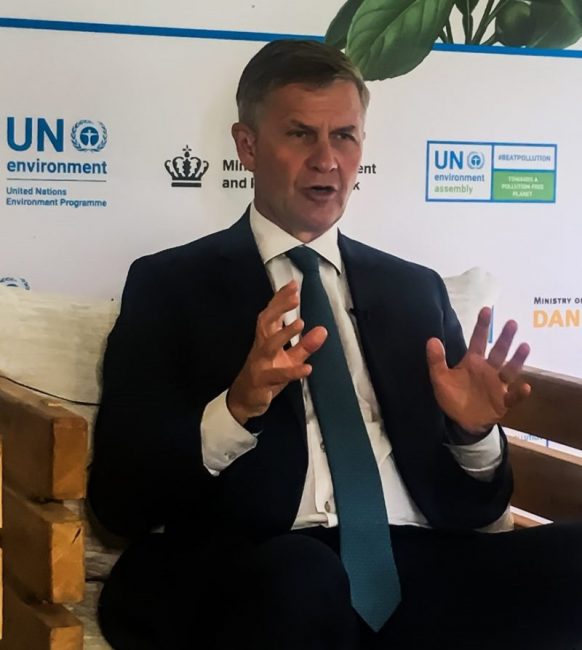Huge progress on reforming the global financial system over the last four years has started to deliver desperately needed financing for sustainability and set up the next wave of action, according to a new United Nations report released on Tuesday, April 17, 2018.

However, the final report of the UN Environment Inquiry into the Design of a Sustainable Financial System cautions that current financial flows are still nowhere near enough to deliver the trillions of dollars needed each year to finance the Sustainable Development Goals (SDGs) and the Paris Agreement.
“Over the four years of the Inquiry’s operations, we have seen reform of the global financial system gather pace as banks, investors and regulators realize they must step up – not just to protect people and the planet, but their bottom lines,” said Erik Solheim, head of UN Environment.
“This is hugely encouraging, but we now have to turn widespread acknowledgement of the need for change into a global movement that delivers the finance we require to provide a better future for everyone.”
Evidence of change
The Inquiry, which completed its four-year mandate in March 2018, worked with policymakers, international organisations, financial institutions and civil society to help put sustainable finance at the heart of the development debate.
Its final report, “Making Waves: Aligning the Financial System with Sustainable Development”, finds that sustainability is now becoming part of routine practice within financial institutions and regulatory bodies.
Green bond issuance grew from $11 billion in 2013 to $155 billion in 2017. Key to this growth has been the market-creating role of public authorities, including key development banks. Yet such progress needs to be set against the scale of the global bond market of around $100 trillion.
Divestments in carbon-intensive assets reached an estimated $5 trillion in 2016, set against investments in coal, oil and gas over the same period of around $710 billion.
National action is critical, and there are a growing number of ambitious roadmaps on sustainable finance. Each is important, but some catalyse broader international action. For example, China’s new Guidelines for Establishing a Green Financial System are the world’s most comprehensive set of national commitments, covering priorities across banking, capital markets and insurance.
The number and range of policy measures to advance sustainable finance has increased. At the end of 2013, 139 policy and regulatory measures were in place across 44 jurisdictions. Four years on, the number of measures has risen to 300 in 54 jurisdictions, with a substantial rise in system-level initiatives.
There has been a striking growth in international initiatives, such as the G20 Green Finance Study Group (GFSG), co-chaired by China and the UK, with UN Environment serving as its Secretariat. The GFSG continued under the German G20 Presidency in 2017 and is operating as the Sustainable Finance Study Group under the Argentinian G20 Presidency in 2018.
Getting the financial system we need
Although the report finds that capital is beginning to flow to the new economy, it cautions that far more is continuing to support the old economy.
“Making Waves shows that systemic change is possible, in this case in how global finance aligns to sustainable development,” said Simon Zadek, Co-Director of the Inquiry. “It also reminds us that this is unfinished business – we need more waves of action to deliver the timely scale of changes needed to get the job done.”
However, the engagement of increasingly influential players, the growth of powerful coalitions that support collaborative action, the shifting focus towards areas such as digital finance, the roles of rating agencies, and key policy platforms such as the G20 all point to further action.
“Most of the initiatives that are now underway to accelerate sustainable finance, whether by central banks, pension funds, credit rating agencies or insurance companies, would have been simply unthinkable when the Inquiry started back in 2014,” said Nick Robins, Co-Director of the Inquiry. “This should us give us confidence that we can achieve the alignment of the financial system with sustainable development.”
The next phase in sustainable finance will be about making the shift from acknowledgement to alignment. It will be multidimensional and non-linear. It will involve new, better ways of doing finance. It will require new performance metrics for the financial system, ones that measure the extent to which sustainability is really part of the process of finance as well as its outcomes.
Although the Inquiry’s mandate is fulfilled, its work to catalyse change will continue through UN Environment, Sustainable Finance at the G20, coalitions for actions such as the Network of Financial Centres for Sustainability, the Sustainable Digital Finance Alliance and the Sustainable Insurance Forum.
Similarly, country-specific work will increasingly involve other parts of the United Nations system, partly catalysed by the support provided by the Inquiry to the UN Secretary-General’s leadership in championing sustainable finance.
